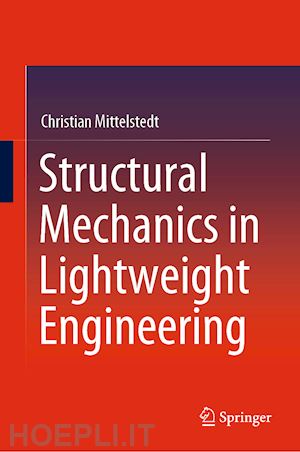
Questo prodotto usufruisce delle SPEDIZIONI GRATIS
selezionando l'opzione Corriere Veloce in fase di ordine.
Pagabile anche con Carta della cultura giovani e del merito, 18App Bonus Cultura e Carta del Docente
This book provides a comprehensive yet concise presentation of the analysis methods of lightweight engineering in the context of the statics of beam structures and is divided into four sections. Starting from very general remarks on the fundamentals of elasticity theory, the first section also addresses plane problems as well as strength criteria of isotropic materials. The second section is devoted to the analytical treatment of the statics of beam structures, addressing beams under bending, shear and torsion. The third section deals with the work and energy methods in lightweight construction, spanning classical methods and modern computational methods such as the finite element method. Finally, the fourth section addresses more advanced beam models, discussing hybrid structures as well as laminated and sandwich beams, in addition to shear field beams and shear deformable beams. This book is intended for students at technical colleges and universities, as well as for engineers in practice and researchers in engineering.
Univ.-Prof. Dr.-Ing. habil. Christian Mittelstedt studied civil engineering at the University of Wuppertal, Germany, where he received his engineering diploma in 1999. He defended his doctoral thesis about the mechanics of composite structures in 2005 at the University of Siegen, Germany, and joined the aerospace industry in northern Germany afterwards where he worked as research engineer from 2006 - 2011, and as a technical leader for research and development from 2011 - 2016. During his time in industry he defended his habilitation thesis about stability problems in thin-walled composite structures in 2012 at Technical University of Darmstadt. In 2016 he was appointed as full professor and as the head of the Institute for Lightweight Construction and Design (KLuB) at the department of Mechanical Engineering of the Technical University of Darmstadt.











Il sito utilizza cookie ed altri strumenti di tracciamento che raccolgono informazioni dal dispositivo dell’utente. Oltre ai cookie tecnici ed analitici aggregati, strettamente necessari per il funzionamento di questo sito web, previo consenso dell’utente possono essere installati cookie di profilazione e marketing e cookie dei social media. Cliccando su “Accetto tutti i cookie” saranno attivate tutte le categorie di cookie. Per accettare solo deterninate categorie di cookie, cliccare invece su “Impostazioni cookie”. Chiudendo il banner o continuando a navigare saranno installati solo cookie tecnici. Per maggiori dettagli, consultare la Cookie Policy.